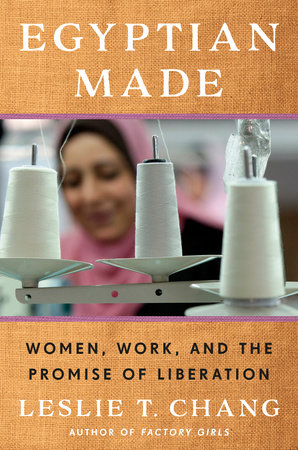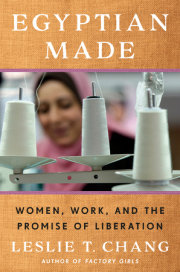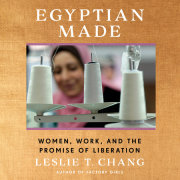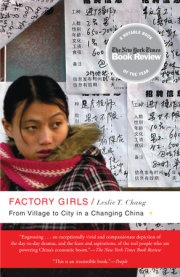1
The Best Workers on EarthAlmost no one worked in an Egyptian factory because she wanted to. Teenage girls might do it for a while to buy things for their gihaz—the china plates and serving bowls, the big and the small teapots, the bedsheets and nightgowns and ten or twelve or twenty sets of everything they needed in their trousseau before a man would agree to marry them. Some of the older women were divorced or widowed and had children to support. The married ones usually needed money badly enough that their husbands had agreed, reluctantly, to let them work outside the home.
Rania Saeed Mohamed didn’t fit into any of these groups. She was twenty-two and married but living apart from her husband when she started working at a men’s underwear factory outside the city of Minya. The plant was an hour’s bus ride from her village, and normally a wife would have asked her husband’s permission before taking such a step. But Rania didn’t consult anyone. Unhappiness gave her freedom, although that wasn’t a trade she would have made on her own. As with almost everything else in her life, she didn’t have a choice.
On Rania’s second day in the factory, a Romanian American manager named Elena asked a group of new recruits: “Who wants to work in quality control?”
Rania raised her hand. “I can do it.” She wasn’t sure what quality control was.
Elena was the first foreigner she had ever met. She trained Rania to spot every potential problem in a pair of men’s underpants. If a leg was a few millimeters short, or the seams around the crotch didn’t lie flat, a client could reject the order and cost the company thousands of dollars. Inside every garment factory, there’s a never-ending battle between production and quality—hour after hour, workers must turn out hundreds of items to exacting standards. Rania developed a preternatural ability to keep the assembly line moving while catching mistakes almost as soon as they happened. Rania isn’t just a factory girl, Elena began telling her colleagues. She’s a manager. She sees and knows everything.
Elena taught Rania another important lesson: When someone criticizes your work, stand your ground and answer back. In Rania’s early days, a trainer named Rabab El-Sayyid often shouted at her—shouting being an act as common as breathing inside an Egyptian factory. Rania learned to respond directly and calmly to the attacks from the older woman. One day she realized that she wasn’t scared of Rabab anymore. Two years after she entered the factory, Rania was promoted to supervise her own line, just as Elena had promised.
There are no secrets in a clothing factory. Every hour, each production line’s output is recorded on a whiteboard in black marker. The numbers are printed out daily, stapled together, and passed around from hand to hand like factory samizdat, and supervisors who missed their targets are called into the manager’s office to explain themselves. Rania’s capacity for work was legendary. She was bi-mit ragil, as the Egyptians say—“worth a hundred men” (even in a factory that employed over 90 percent women, men remained the gold standard). Every month, the factory gave awards to its most productive workers, and Rania’s line placed first more times than she could count. The prize dinnerware sets and teakettles cluttered her kitchen cabinet at home, useless in their abundance.
Some people in the factory said that Rania manipulated production figures to make herself look better, and her tendency to play favorites didn’t sit well with everyone. She had a way of attracting notice and charging into conversations, and executives or clients visiting the plant always asked who she was. “Whenever management comes, there’s just a little more interaction with Rania than with other people. She’s always in their face” is how one senior manager put it. “Arrogant, bullying, bossy,” another executive rapped out between pursed lips. With her red supervisor’s tunic, wide-legged black trousers, and silver bracelets jangling on her wrists, Rania stood out for her authority and sense of style. She was often the only woman in the factory who was wearing pants.
Rania didn’t know it yet, but her bosses had big plans for her. Most of the executives in the factory came from outside Egypt, and they were eager to promote a woman into a leadership position as a way to show all their other female employees what was possible. Little by little, they would add to Rania’s production and management responsibilities. But they needed to be careful. If she took on too much at once, she might fail spectacularly and turn into a warning about what happens to women with too much ambition.
For every Egyptian woman who works, four others stay home. The nation’s percentage of women in the labor force is among the lowest in the world, and the number has remained flat for the past quarter of a century; among some groups, such as college graduates, it has actually fallen. These facts contradict the common belief that globalization will bring opportunity, create jobs for women, and overturn social norms. It did happen this way in Taiwan and South Korea, China, and India, and in conservative Muslim nations such as Malaysia and Bangladesh.
Since the 1970s, Egypt has become deeply integrated into the international economy through its political alliances along with increased trade, tourism, and migration. But the prospects for Egyptian women are getting worse. They’re less likely to enter the workforce than they were ten years ago. They’re more focused on making a good marriage and becoming more financially dependent on men. In the experience of these women, globalization has closed more doors than it has opened.
In other social realms, the country has made some progress toward equalizing opportunity for women. Girls and boys now attend school in comparable numbers, and Egyptian universities enroll more female than male students. Women are living longer, marrying later, and having fewer children than they did several decades ago. But the MENA region—the Middle East and North Africa—is the only part of the world in which such gains have not propelled women into the workforce, a puzzle that economists call “the gender equality paradox.” A World Bank study estimated that average household income would rise by as much as 25 percent if women in the Middle East worked at the same rates as their peers in other parts of the world. The bank also estimated that at the current rate of increase in female employment, it would take the region’s women a hundred fifty years to catch up to the rest of the world.
Resistance to female employment is grounded in a specific idea about male dignity. When a woman works outside the home, her family and community often interpret this act as a failure on the part of her husband. Chapter 4, verse 34, of the Quran says: Men are the protectors and maintainers of women, because God has given the one more than the other, and because they support them from their means. Marriage is a complementary arrangement—the man supports his wife, and she obeys him in return—and wifely submission is written into the Egyptian legal code. A woman who leaves the house without her husband’s permission is considered nashiz—rebellious—and forfeits her right to his financial support.
Even when women work, their range of social acceptability is narrow. Most women are reluctant to travel far from home on public transportation, for fear of sexual harassment; they don’t want to spend their days in small workplaces or shops, which may bring them into close contact with male cofuworkers or strangers; they would rather leave work in time to be home to cook dinner for their husbands. Unemployment in Egypt is four times higher for women than for men—20 percent, compared with 5 percent—in large part because women turn down jobs that might compromise their domestic responsibilities or their reputation.
“It’s not about the wage. It’s really about the working conditions,” Ragui Assaad, an economist at the University of Minnesota who studies labor and development, told me. Many of the jobs available in the Egyptian economy, he continued, are with small or informal enterprises that may require women to travel great distances, work long hours, or be exposed to sexual harassment. “If the working conditions are met, women are ready to work in droves. But if they’re not met, very few are willing to work.”
Since the 1960s, when Gamal Abdel Nasser guaranteed jobs for all high school and college graduates, women have seen the government as the ideal employer. These positions offer gender-blind hiring and wages, good benefits, short workdays, and large workplaces with the stamp of respectability. But the public sector is shrinking—it employs 5.6 million people, down from almost six million two decades ago—and female labor participation has dropped in tandem. More than 40 percent of all working women are still concentrated there as administrators, clerks, nurses, and teachers. Even better than a sinking ship, though, may be no ship at all: Between 2006 and 2012, the number of women in the workforce fell by six hundred thousand, and it has continued to decrease since then.
Copyright © 2024 by Leslie T. Chang. All rights reserved. No part of this excerpt may be reproduced or reprinted without permission in writing from the publisher.







